The WISH initiative provides an integral service both during and after the pandemic
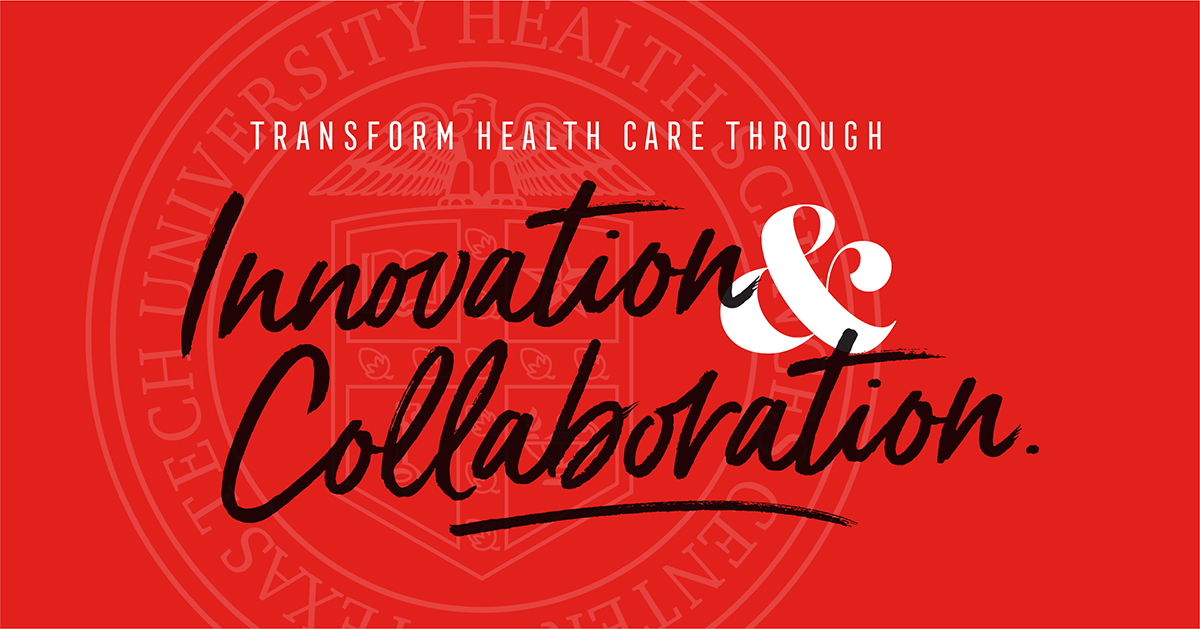
The new vision at Texas Tech University Health Sciences Center (TTUHSC) aims to transform health care through innovation and collaboration. Our vision is not only about the biggest names in science and leadership—everyone plays a vital role. This series seeks to highlight innovative individuals and groups that work together to create transformative ideas and shape health care, revealing what makes this university extraordinary.
At the start of the COVID-19 pandemic, while businesses closed and hospitals were stretched thin, compassionate individuals across America were compelled to pull together knowledge and resources as they never had before in order to save lives. West Texas was no exception.
It was during this time that Al Sacco Jr., Ph.D., Dean of Edward E. Whitacre Jr. College of Engineering at Texas Tech University (TTU) encouraged Jnev Biros, M.D., MPH, a research associate with the College of Engineering Dean’s Office, to call together a group of experts within the TTU and TTUHSC communities in hopes of providing a desperately needed service to the rural health care community.
WISH, or West Texas Innovations Serving Healthcare professionals, is a web-based platform that enables professionals within the TTU College of Engineering and experts at the TTUHSC School of Medicine to connect with the health care professionals in rural hospitals for developing technologies or allowing access to technical expertise. It also serves as a communication platform for rural hospitals to connect with other hospitals—sharing best practices during uncertain times. Today, the initiative is going strong and has new objectives and intentions for a brighter future in rural health care.

Jnev Biros’s outreach activities reside with the College of Engineering, but her connection
to TTUHSC is a strong one: she is a physician by training, with a background in public
health.
“I facilitate and manage our college and faculty level collaborations with TTUHSC and the health care community in west Texas, including education, research and outreach,” explained Biros.
Around mid-March of 2020, Dean Al Sacco and Dr. Biros came together with a few individuals from TTUHSC School of Medicine and the Honors College to create and provide essential PPE to those in need.
“We gathered to start an initiative that we strongly thought would benefit the frontline health care workers in and around Lubbock,” said Biros. “The initiative then turned into a consortium, drawing more volunteers and community partners from both the TTU system and other partners that invested an enormous amount of time to make sure we supplied much needed PPE to our frontline workers.”
What started as help providing specific resources expanded quickly when Biros and others saw how much these rural areas needed assistance.
“As we got more engaged with the rural communities and the small hospitals, we realized there was much more that they needed than met the eye,” said Biros.

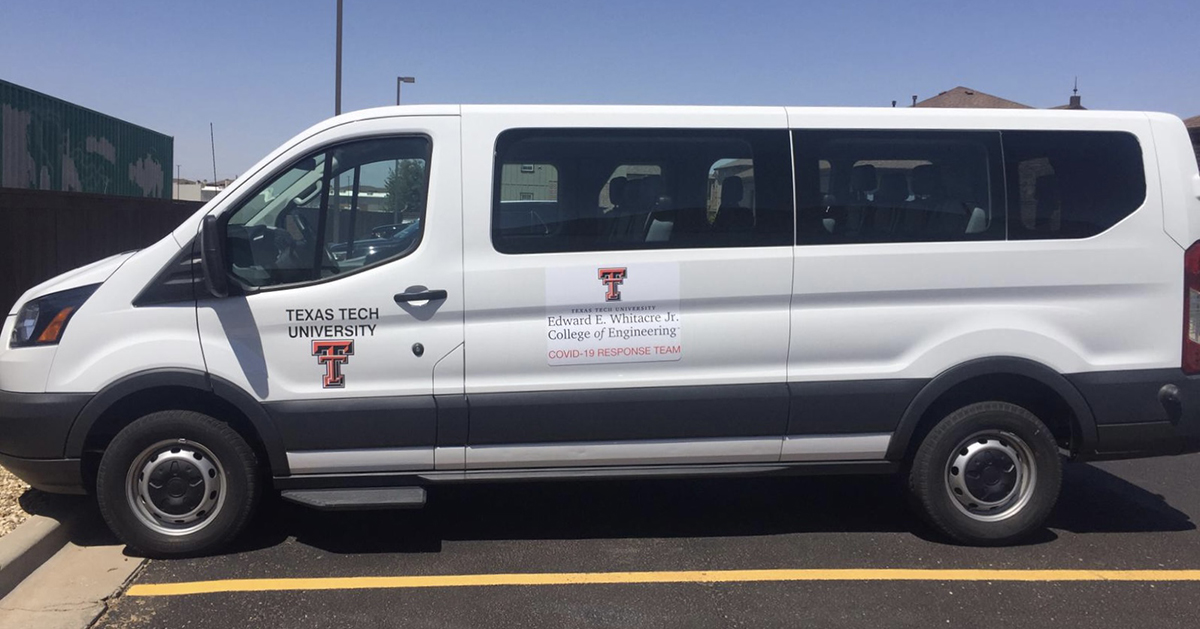
The van used by the COVID-19 Response Team to drive to rural hospitals
Within the College of Engineering, Biros led a group of volunteers called the COVID-19 Response Team. This team of students, faculty and staff visited the small critical access hospitals and medical centers to identify and assess problems within the hospitals that the College of Engineering can help solve.
As the COVID-19 Response Team worked to help rural health care professionals, it became clear that the right group of individuals would be able to solve many of the problems posed by rural hospitals. Biros lauds the College of Engeneering’s collaboration with the TTUHSC School of Medicine for many of the solutions that this group has been able to provide.
“Throughout our conversations with the rural hospitals, we continued to collaborate with the TTUHSC School of Medicine. They were instrumental for us to get to the right resources,” Biros said. “Dr. Simon Williams, the Associate Dean of Academic Affairs, and Dr. Ebtesam Islam from Internal Medicine were our primary contacts and were always helpful when we sought advice on fine tuning specifics of the technology or on procuring resources.”

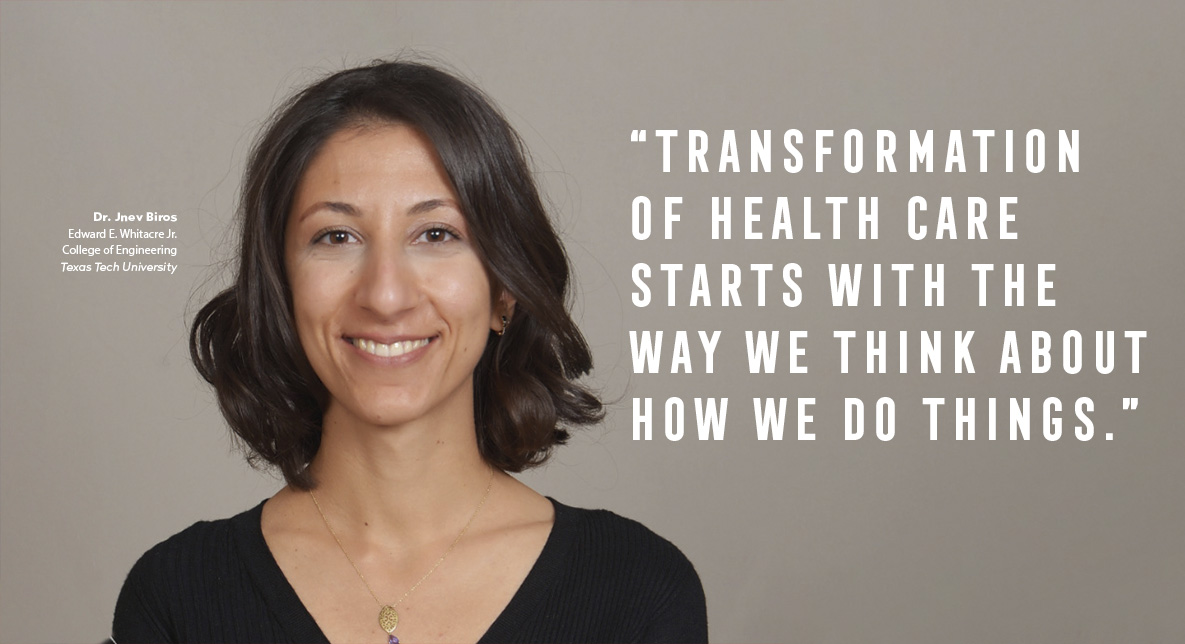
While some of these hospitals needed medical equipment that could not be purchased due to a lack of funds or availability, most of the time the hospitals’ needs had practical solutions.
“Often they do not have the technical expertise to get to that solution,” Biros said. “For instance, during the course of our conversations with the hospital staff it became very evident that the lack of negative pressure rooms was a shared concern among many rural hospitals.”
Biros explained that a shortage of negative pressure rooms—which are a type of hospital room that holds patients with infectious illnesses and keeps them away from other patients, visitors and health care staff—is a primary reason that small hospitals across the country feared they were not designed to take care of large numbers of COVID-19 patients.
“We took this concern back to our technical team consisting of students, faculty and staff, and discussed the ways in which we could help them,” Biros said. “Ultimately, the team came up with a design that would suit the needs and infrastructure of the hospital.”
Once the team was able to provide valuable assistance, the focus turned to optimal communication for these solutions.
“We decided we should come up with a way to streamline communication between the rural
hospitals and our engineers,” said Biros.
With that need identified, the idea of a web-based platform was born. The WISH web
portal forms an efficient way to connect with the rural hospitals and meet their needs
swiftly.

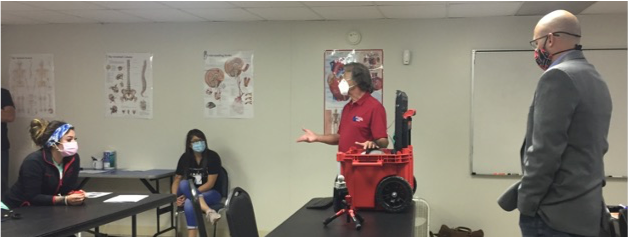
Faculty discussing the transport ventilator project with hospital staff
Even though the horrible reality of COVID-19 brought this group together, it does not have to be within the context of a pandemic in order for this initiative to make positive change—especially now that virtual platforms have become an essential part of communication across the globe.
“In the post-COVID era we envision that WISH will sustain the communication among the rural West Texas health care community, until a better way is developed.” said Biros, explaining that rural hospitals are remote from each other (and from larger hospitals), which made collegial interaction limited. However, Biros suggested, it doesn’t have to stay that way.
“In an age of accelerated use of virtual meetings, providing a secure platform for our rural health care community to exchange resources and best practices is only a matter of efficient collaboration. That’s how we would like to see our project come to fruition,” said Biros. “We are engaging the stakeholders and end-users of our portal in every step of the design process. This includes the nurses, administrators from rural hospitals.”

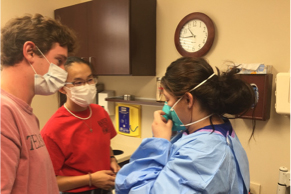
TTU students fit testing at a rural hospital
The WISH initiative and all of the individuals involved have shown what it really means to transform health care for West Texas. For Biros, these necessary changes come from deliberately seeking new perspectives.
“The transformation of health care starts with the way we think about how we do things,” said Biros. “It’s about getting a new perspective.”
Biros explained that, even when processes are not wrong or broken, it is worth trying something new and different.
“If you are not open to the unfamiliar—to considering the positives that would come with the unfamiliar—you may miss opportunities to better serve your patients and community.”
While being open to new ideas does not always mean abandoning the old ways, it does mean observing and learning from others. When Biros and the design team (led by Dean Al Sacco and Derek Johnston, an instructor in the Department of Electrical and Computer Engineering at TTU) initially envisioned creating a portal, one of their first steps was to search what advancements others in their field had already made.
“We found that another engineering school in Alabama had come up with a similar idea that would connect researchers to engineers and technology designers, but in an entirely different context,” said Biros. “We learned from their innovation and moved on to create something of our own.”
Ultimately, Biros and her team prove that transforming the world of health care is about communication, humility and working together in the face of difficulties.
“In today’s world, collaboration sits at the core of innovation,” said Biros. “When we put in the effort and break the boundaries of disciplines, we step into an unexplored world of opportunities. These boundaries could be cultural, operational or simply motivational. Observing people from different disciplines and intellectual backgrounds working together has shown me that fruitful collaboration is deeply rooted in mutual understanding, where all participants can maintain a sense of cultural humility and not lose sight of their shared vision despite disagreements and potential setbacks.”
